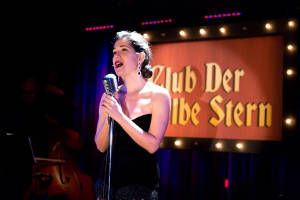 | go
to index of reviews | go to entry
page | | go to other departments |
| go
to index of reviews | go to entry
page | | go to other departments |
Paulanne Simmons
|
The Yellow Star Shines at the New York Musical Theater Festival
Der Gelbe Stern (The Yellow Star)
After World War I, cabarets were extremely popular in Europe, especially in the Weimar Republic. With the fall of the Hapsburg Empire, censorship was lifted and the cabarets became famous (or infamous) for entertainment that was irreverent, anarchistic and racy. But when Hitler came to power, all that quickly changed, as entertainment was sanitized, nazified and purged of Jews, who had been so strong a presence in this daring and dazzling form of entertainment "Der Gelbe Stern" (The Yellow Star), conceived and performed by Alexis Fishman, and written by Fishman with James Millar, celebrates those heady times in the person of Erika Stern, a fictional Jewish chanteuse struggling to survive in pre-war Berlin. After an initial run in Australia,the show has come to the New York Musical Theatre Festival, under the direction of Sharone Halevy. Erika is elegant and vulgar, defiant and vulnerable, reflective and blasé. She arrives late, slamming the door and cursing under her breath. But within seconds she wins over the audience. We realize her life is difficult, and she is trying her best.
Erika makes the audience part of the show by addressing imaginary friends and lovers who have come to see her perform. She teases her loyal piano player (Heath Saunders) and occasionally even the band (Steve Millhouse on bass and Giuseppe Fusco on woodwinds), all exemplary musicians. She steps down from the stage, sits on the bar and sips from a bottle. The songs Erika sings are romantic, playful and naughty. Not all of them come from this time period (the show mixes Jacques Brel with Friedrich Hollander), but they are all appropriate to the style and theme of the show. A few, such as "The Jews Are All To Blame" and "Heil Hitler, Ja Ja Ja," take direct aim at the Nazis. Erika remains funny, ironic and defiant throughout. But as the show progresses, it becomes more and more apparent that her life and career are in imminent danger. Lovers betray her. Employers abandon her. We all know what awaits her.
|
| museums | NYTW mail | recordings | coupons | publications | classified |


